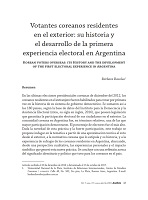Votantes coreanos residentes en el exterior: su historia y el desarrollo de la primera experiencia electoral en Argentina
DOI:
https://doi.org/10.32870/mycp.v7i19.566Palabras clave:
voto en el exterior, Corea del Sur, comunidad coreana en Argentina, participación electoral desde el exterior, migrantesResumen
En las últimas elecciones presidenciales coreanas de diciembre del 2012, los coreanos residentes en el extranjero fueron habilitados para votar por primera vez en la historia de su sistema de gobierno democrático. Se sumaron así a los 180 países, según la base de datos del Instituto para la Democracia y laAsistencia Electoral (idea, su sigla en inglés, 2016), que poseen legislación que garantiza la participación electoral de sus ciudadanos en el exterior. La comunidad coreana en Argentina fue, en términos relativos, una de las que mayor participación demostraron. El porcentaje de electores fue el más alto.Dada la novedad de esta práctica y la fuerte participación, este trabajo se propone indagar en la temática a partir de una aproximación teórica al voto desde el exterior, a la normativa coreana que lo estipula y su historia, y a la experiencia de sufragio de los coreanos residentes en Argentina, abarcando, desde una perspectiva cualitativa, las experiencias personales y el impacto simbólico que generó esta nueva práctica. Se concluye con una reflexión acerca del significado identitario y político que tuvo para los coreanos en el país.Descargas
Citas
Emmerich, N. (2012), “El sufragio transnacional en el mundo”, Más poder local, 11, pp. 20-21.
Emmerich, G. y X. Peraza Torres (2011), “Sufragio transnacional. Experiencias latinoamericanas de voto desde el exterior y voto de los extranjeros”, en G. Emmerich y L. Pries (coord.), La transnacionalización. Enfoques teóricos y empíricos (pp. 155-185), México, d.f., México, Miguel Ángel Porrúa y Universidad Autónoma Metropolitana.
idea (2016), Database Overseas Vote. Disponible en: http://www.idea.int/es/.
Im, H. y H. K. Kim, (2014), “Revisiting the Constitutionality of the Voting Rights of Overseas Koreans”, Korea Journal, 54 (1), pp. 5-29.
Kalicki, K. (2009), “Ethnic Nationalism and Political Community: The Overseas Suffrage Debates in Japan and South Korea”, Asian Studies Review, 33(2), pp. 175-195. doi: dx.doi.org/10.1080/10357820902923241.
Kim, T. (2012), “First vote for president at 43”, The Korea Times, 12 de noviembre. Disponible en: http://www.koreatimes.co.kr/www/news/people/2016/09/178_126579.html
Lafleur, J. M. (2012), “Transnacionalismo, diáspora y voto en el exterior. Introducción”, en J. M. Lafleur (ed.), Diáspora y voto en el exterior: La participación política de los emigrantes bolivianos en las elecciones de su país de origen (pp. 15-38), España, cidob.
Lee, C. (2010), “South Korea: The Transformation of Citizenship and the State-Nation Nexus”, Journal of Contemporary Asia, 40 (2), pp. 230-251.
doi: dx.doi.org/10.1080/00472331003597562.
Marshall-Barberán, P. (2011), “El derecho a votar desde el extranjero”, Revista de derecho (Valdivia), 24(2), pp. 139-161. doi: dx.doi.org/10.4067/S0718-09502011000200006.
Ministry of Foreign Affairs and Trade (2011), Status of Overseas Koreans Report 2011. Disponible en: http://www.mofa.go.kr/webmodule/htsboard/template/read/korboardread.jsp?typeID=6yboardid=232yseqno=334627yc=yt=ypagenum=1ytableName=TYPE_DATABOARDypc=ydc=ywc=ylu=yvu=yiu=ydu=.
——— (2013), 재외동포현황 [Coreanos de ultramar]. Disponible en: http://www.mofa.go.kr/webmodule/htsboard/template/read/korboardread.jsp?typeID=6yboardid=232yseqno=347383yc=yt=ypagenum=1ytableName=TYPE_DATABOARDypc=ydc=ywc=ylu=yvu=yiu=ydu=.
——— (2014), Diplomatic White Paper, 2016 (Parte 6). Disponible en: http://www.mofat.go.kr/ENG/policy/whitepaper/index.jsp?menu=m_20_160.
National Electoral Commission (2012), 123,571 Overseas Voters Confirmed for the 19th National Assembly Elections [Press Releases]. Disponible en: http://www.nec.go.kr/engvote_2013/04_news/02_02.jsp?num=180ypg=21ycol=ysw.
——— (2013a), 4.24 재.보선 국회의원선거 최종 투표율 결과 [4.24 Resultados finales de participación para la elección de los miembros de la Asamblea]. Disponible en: http://www.nec.go.kr/abroad/bbs/view/B0000342/4557.do?menuNo=801030ysearchYear=ysearchMonth=ysearchWrd=ysearchCnd=yviewType=ypageIndex=30ysection=20ysearchOption1=.
——— (2013b), 중앙선관위, 제18대 대선 투표율 분석 결과 공개 [La Comisión Nacional Electoral anuncia el resultado de la 18ª elección presidencial]. Disponible en: http://www.nec.go.kr/abroad/bbs/view/B0000342/4522.do?menuNo=801030ysearchYear=ysearchMonth=ysearchWrd=ysearchCnd=yviewType=ypageIndex=32ysection=20ysearchOption1=.
New America Media (2016), Election Results Show Strong Opposition Among S.Koreans Abroad to Ruling Party. Disponible en: http://newamericamedia.org/2016/04/election-results-show-strong-opposition-among-s-koreansabroad-to-ruling-party.php.
Sin, Y. (2016), 아직 갈길 먼 재외 투표…10% 투표율 ‘마의 벽’인가 [Voto en el extranjero, un largo camino por recorrer, la “muralla” es del 10%]
Yonhap News, 4 de mayo. Disponible en: http://www.yonhapnews.co.kr/bulletin/2016/04/05/0200000000AKR20160405148100371.HTML?input=1195m.
Spiro, P. (2006), Perfecting Political Diaspora, New York University Law Review, 81 (1), pp. 207-233.

Publicado
Cómo citar
Número
Sección
Licencia
Política de acceso abierto
Esta revista proporciona un acceso abierto a su contenido, fiel al principio de que ofrecer al público un acceso libre a las investigaciones ayuda a un mayor intercambio global del conocimiento.
MyCP se publica bajo la licencia de Creative Commons Reconocimiento-No Comercial CC BY-NC
Los contenidos serán publicados en versión PDF y XML.
Los autores(as) que publiquen en México y la Cuenca del Pacífico aceptan las siguientes condiciones:
De acuerdo con la legislación de derechos de autor, México y la Cuenca del Pacífico reconoce y respeta el derecho moral de los autores(as), así como la titularidad del derecho patrimonial, mismo que será cedido a la Universidad de Guadalajara para su difusión en acceso abierto.
México y la Cuenca del Pacífico no realiza cargos a los autores(as) por enviar y procesar artículos para su publicación.
Los autores(as) pueden realizar otros acuerdos contractuales independientes y adicionales para la distribución no exclusiva de la versión del artículo publicado en México y la Cuenca del Pacífico (por ejemplo, incluirlo en un repositorio institucional o darlo a conocer en otros medios en papel o electrónicos) siempre que indique clara y explícitamente que el trabajo se publicó por primera vez en México y la Cuenca del Pacífico.
Una vez que se acepte el artículo para su publicación los autores(as) deben remitir el formato de carta-cesión de derechos de la publicación debidamente requisitado y firmado por los autores(as). Este formato debe ser remitido en archivo PDF paralelamente con la versión final del artículo al correo: mexicoylacuenca@gmail.com.
Los lectores/usuarios de México y la Cuenca del Pacífico pueden acceder directamente al contenido de manera libre y gratuita en todo momento, incluyendo cuando un nuevo número es colocado en la plataforma. Se permite al lector/usuario citar, compartir (electrónicamente y de manera física), imprimir y distribuir el material siempre que se indique de manera clara y explícitamente que el trabajo se publicó por primera vez en México y la Cuenca del Pacífico. Es necesario citar de manera correcta el trabajo y no debe de ser utilizado con fines comerciales.




